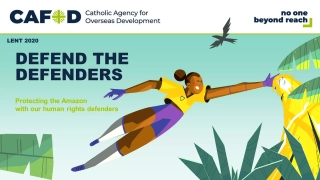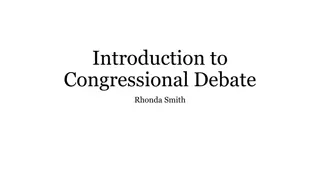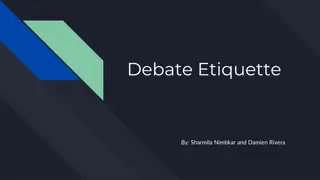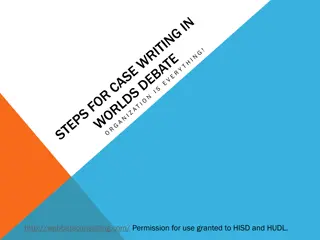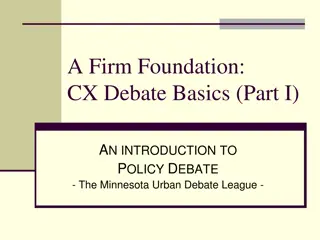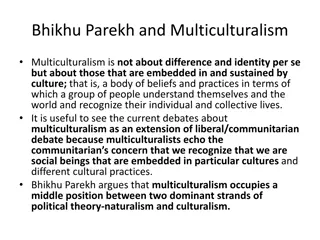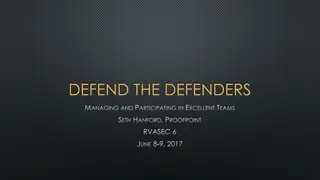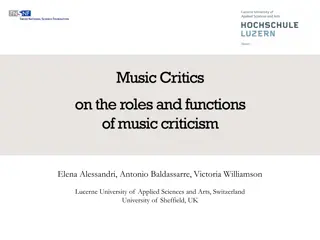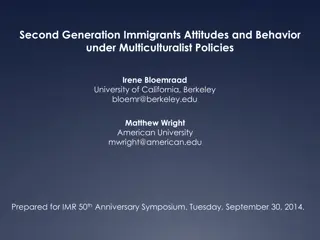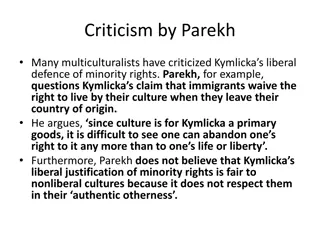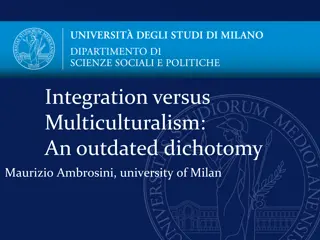Critics and Defenders in Multiculturalism Debate
Critics of multiculturalism argue that its focus on cultural inequalities diverts attention from socio-economic issues, while defenders like Kymlicka advocate for balancing cultural recognition with equal rights. Feminist critics raise concerns about cultural support for individual self-respect, particularly for women in traditional cultures. Kymlicka emphasizes the importance of a stable cultural structure while allowing for cultural evolution. He highlights the need to recognize the distinctiveness of cultural communities within a liberal framework.
Download Presentation

Please find below an Image/Link to download the presentation.
The content on the website is provided AS IS for your information and personal use only. It may not be sold, licensed, or shared on other websites without obtaining consent from the author.If you encounter any issues during the download, it is possible that the publisher has removed the file from their server.
You are allowed to download the files provided on this website for personal or commercial use, subject to the condition that they are used lawfully. All files are the property of their respective owners.
The content on the website is provided AS IS for your information and personal use only. It may not be sold, licensed, or shared on other websites without obtaining consent from the author.
E N D
Presentation Transcript
Critics of Multiculturalism-- Critics of multiculturalism believe that its preoccupation with cultural inequalities detracts from the most pressing social issues facing capitalist societies, namely, socio-economic inequalities. Multiculturalists face a challenge to explain how the policies they defend will help the least advantaged. The fight for redistribution is the important battle as insisted by the egalitarins. While doubting whether group rights constitute the most appropriate form of compensation for the disadvantages Kymlicka identifies they also fear that group rights will undermine individuals autonomy.
Feminist Criticism Kymlicka s vision of a culturally embedded identity is only compatible with autonomy if the distinction he draws between the structure of a culture and its character can be maintained. Yet, in the eyes of critics, this distinction simply cannot be sustained. Furthermore, while Kymlicka stresses the link between secure cultural membership and self-respect, feminist critics such as Susan Okin have been quick to point out that the degree to which a culture supports an individual s self-respect depends to a considerable extent upon the role the individual occupies within that culture. This may constitute a particularly acute problem for women who in many traditional cultures have not been highly valued.
Kymlickas Defence Although Kymlicka regards a stable societal culture as vital to individual well-being, he stresses that members of a culture community should be free to modify the character of the culture, should they find its traditional ways of life no longer worthwhile . Here Kymlicka distinguishes between the underlying cultural structures and the specific cultural character of a community. The cultural structure of a community refers to the distinctive ordering of the roles within the culture, while the character of a culture is a reflection of a culture s norms, values and their attendant institutions. What is important here is that changes in a culture s character do not undermine the stability of its structure. Thus, the need for a stable cultural structure is compatible with the freedom of members to revise a culture s norms, values and traditions.
Kymlickas Defence----(Contd.) Kymlicka proposes that contemporary liberals have lost touch with the insights of earlier liberal tradition due to their failure to appreciate the complex relationship between political and cultural community. While the political community constitutes the arena in which fellow citizens exercise the rights and responsibilities entailed by the framework of liberal justice , the cultural community is the place within which individuals form and revise their aims and ambitions. Thus, the need to respect individuals as members of distinct cultural communities requires recognition of the importance of their specific cultural heritage and the legitimacy of their claims to have their culture protected. Kymlicka believes that contemporary liberals implicitly assume that the boundaries of the political and the cultural community coincide, which is not the case in culturally diverse societies. So, liberal committed to the idea of equality of respect will need to balance claims for cultural recognition vis- -vis a commitment to equal rights.
Kymlickas Defence----(Contd.) Kymlicka draws a distinction between internal restrictions and external protections. While the former deals with the relationship between the group and its own members, the latter involves the claims of a group against the larger society. Since liberals value cultural membership because it enables individuals effectively to exercise their autonomy, groups may place internal restrictions on their members which would undermine individual freedom. Such restrictions are not compatible with liberal principles. Thus, cultural groups can only legitimately expect support in their attempts to maintain themselves if such measures do not undermine individual freedom and autonomy. For Kymlicka, there must be freedom for group members to use and interpret their own cultural heritage.
Deep Diversity and Group Rights Despite Kymlicka s belief that his conception of multicultural citizenship is sensitive to the demands of a wide variety of cultural and ethnic minorities, it is questionable whether his account can accommodate the profound diversity associated with thick multiculturalism. Groups whose conceptions of the good are at odds with the liberal vision of individual freedom and autonomy may well regard Kymlicka s conception of group rights as a threat to their long-term viability. In his recent work tries to respond to these fears by drawing a distinction between a defensible liberal theory of minority rights and imposing that theory upon non-liberal minorities.
Deep Diversity-----(Contd.) While practices that restrict individual freedom cannot be justified on the basis of a liberal theory of group rights, Kymlicka believes that unless the minority commits gross and systematic violations of human rights, liberals should not impose liberal principles upon reluctant minorities. As minorities may well perceive attempts to impose liberal principles as a form of aggression, such attempts are liable to backfire. Besides, liberal institutions can only really work if liberal beliefs have been internalised by the members of the self-governing society. Thus, by their very nature, liberal principles cannot be imposed externally.
Deep Diversity-----(Contd.) Furthermore, minorities are frequently protected by treaties or agreements that stipulate the terms under which the minority was incorporated into the state and Kymlicka maintains that liberals have a duty to honour such agreements. But at the same time, Kymlicka is not suggesting that liberals do not have a right or a responsibility to speak out if a minority conducts its affairs in an illiberal manner. Criticism by liberals such as Okin suggest that many liberal will view a reluctance to interfere with illiberal practices as incompatible with a commitment to the basic principles of equality and autonomy.
Deep Diversity-----(Contd.) Many liberals feel that the state is justified in interfering in the private sphere to stop seriously illiberal practices which discriminate against comparatively powerless groups such as women and children. Thus, it is questionable whether Kymlicka s distinction between a liberal theory of group rights and its imposition can allay the fears of either liberals or advocates of diversity. His conception of multicultural citizenship remains problematic from the perspective of both.




